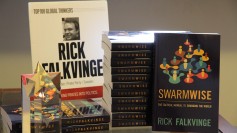
Disaster-affected communities are increasingly becoming “digital” communities. That is, they increasingly use mobile technology & social media to communicate during crises. I often refer to this user-generated content as Big (Crisis) Data. Humanitarian crisis computing seeks to rapidly identify informative, actionable and credible content in this growing stack of real-time information. The challenge is akin to finding the proverbial needle in the haystack since the vast majority of reports posted on social media is often not relevant for humanitarian response. This is largely a result of the demand versus supply problem described here.
. . . . . . . . .
The smaller the micro-stack, the easier the tasks and the faster that they can be carried out by a greater number of volunteers. For example, instead of having 10 people classify 10,000 tweets based on the Cluster System, microtasking makes it very easy for 1,000 people to classify 10 tweets each. The former would take hours while the latter mere minutes. In response to the recent earthquake in Pakistan, some 100 volunteers used MicroMappers to classify 30,000+ tweets in about 30 hours, for example.
Read full post with utterly brilliant photographs that make all this clear.







 Weber sees Enlivenment as an upgrade of the deficient categories of Enlightenment thought – a way to move beyond our modern metaphysics of dead matter and acknowledge the deeply creative processes embodied in all living organisms. The framework of Enlivenment that Weber outlines is a promising beginning for all those who stand ready to search for real solutions to the challenges of our future.
Weber sees Enlivenment as an upgrade of the deficient categories of Enlightenment thought – a way to move beyond our modern metaphysics of dead matter and acknowledge the deeply creative processes embodied in all living organisms. The framework of Enlivenment that Weber outlines is a promising beginning for all those who stand ready to search for real solutions to the challenges of our future.